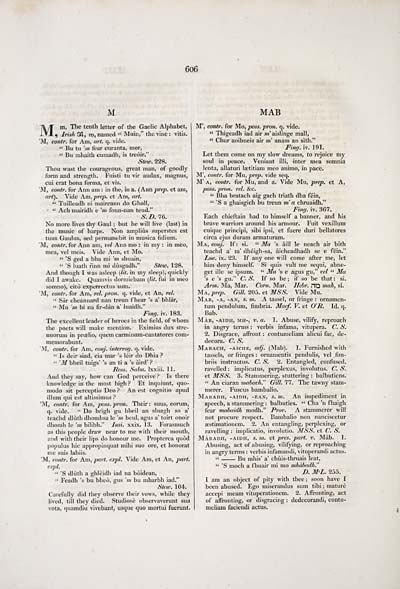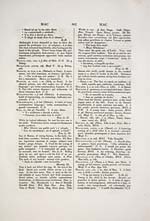Download files
Complete book:
Individual page:
Thumbnail gallery: Grid view | List view

M
Mm, The tenth letter of the Gaelic Alphabet,
9 Irish al, Tt), named " Muin," the vine : vitis.
M, contr. for Am, art. q. vide.
" Bu tu V» fear curanta, mor,
" Bu mhaith cumadh, is treòir."
Steio. 228.
Thou wast the courageous, great man, of goodly
form and strength. Fuisti tu vir audax, magnus,
cui erat bona forma, et vis.
M, contr. for Ann am : in the, in a. (Knn prep, et am,
art). Vide Am, prep, et Am, art.
" Tuilleadh ni maireann do Gholl,
" Ach mairidh e 'm fonn-nan teud."
S.D.1&.
No more lives thy Gaul ; but he will live (last) in
the music of harps. Non ampliùs superstes est
tuus Gaulus, sed permanebit in musica fidium.
'M, contr. for Ann am, vel Ann mo : in my : in meo,
mea, vel meis. Vide Ann, et Mo.
" 'S ged a bha mi 'm shuain,
" 'S luath rinn mi dùsgadh." Stew. 128.
And though I was asleep [lit. in my sleep), quickly
did I awake. Quamvis dormiebam [lit. fui in meo
somno), citò experrectus sum.
'M, coiitr. for Am, rel. pron. q. vide, et An, rel.
" Sàr cheannard nan treun fhear 's a' bhlàr,
" Mu 'm bi na fir-dan a' luaidh."
Fing. iv. 183.
The excellent leader of heroes in the field, of whom
the poets will make mention. Eximius dux stre-
nuorum in prcelio, quem carminum-cantatores com-
memorabunt.
M, contr. for Am, conj. interrog. q. vide.
" Is deir siad, cia mar 's leir do Dhia ?
" 'M bheil tuigs' 's an ti a 's àird' ?
Ross. Salm. Ixxiii. 11.
And they say, how can God perceive ? Is there
knowledge in the most high ? Et inquiunt, quo-
modo sit perceptio Deo ? An est cognitio apud
ilium qui est altissimus ?
'M, contr. for Am, pass. pron. Their : suus, eorum,
q. vide. " Do brigh gu bheil an sluagh so a'
teachd dliith dhomhsa le 'm beul, agus a toirt onoir
dhomh le 'ra bilibh." Isai. xxix. 13. Forasmuch
as this people draw near to me with their mouth,
and with their lips do honour me. Propterea quod
populus hie appropinquat mihi suo ore, et honorat
'M, contr. for Am, part. expl. Vide Am, et An, part.
" 'S dliith a ghlèidh iad na bòidean,
" Feadh 's bu bheò, gus 'm bu mharbh iad."
Stew. 104.
Carefully did they observe their vows, while they
lived, till they died. Studiosè observaverunt sua
vota, quamdiu vivebant, usque quo mortui fuerunt.
MAB
M', contr. for Mo, poss. pron. q. vide.
" Thigeadh iad air m' aislinge mall,
" Chur aoibneis air m' anam an sith."
Fing. iv. 191.
Let them come on my slow dreams, to rejoice my
soul in peace. Veniant illi, inter mea somnia
lenta, allaturi laetitiam meo animo, in pace.
M', contr. for Mu, prep, vide seq.
M' A, contr. for Mu, and a. Vide Mu, prep, et A,
poss. pron. rel. &c.
" Bha bratach aig gach triath dha fein,
" 'S a ghaisgich bu treun m' a chruaidh."
Fhig. iv. 367.
Each chieftain had to himself a banner, and his
brave warriors around his armour. Fuit vexillum
cuique principi, sibi ipsi, et fuere duri bellatores
circa ejus duram armaturam.
Ma, conJ. If: si. " Ma 's àill le neach air bith
teachd a' m' dheigh-sa, àicheadhadh se e fein."
Lite. ix. 23. If any one will come after me, let
him deny himself. Si quis vult me sequi, abne-
get ille se ipsum. " Ma 's e agus gu," vel " Ma
's e 's gu." as. If so be; if so be that: si.
Arm. Ma, Mar. Com. Mar. Hebr. HO mah, si.
Ma, prep. Gill. '205. et MS S. Vide Mu.
Mab, -a, -an, s. m. A tassel, or fringe : ornamen-
tum pendulum, fimbria. Mac/. V. et OR. Id. q.
Bab.
MÀB, -AIDH, MH-, v.a. 1. Abuse, vilify, reproach
in angry terms : verbis infama, vitupera. C. S.
2. Disgrace, affront : contumeliam alicui fac, de-
decora. C. S.
Mabach, -aiche, adj. (Mab). 1. Furnished with
tassels, or fringes : ornamentis pendulis, vel fim-
briis instructus. C. S. 2. Entangled, confused,
ravelled : implicatus, perplexus, involutus. C. S.
et MSS. 3. Stammering, stuttering : balbutiens.
" An ciaran mabach." Gill. 77. The tawny stam-
merer. Fuscus bambalio.
Mabadh, -aidh, -ean, s. m. An impediment in
speech, a stammering : balbuties. " Cha 'n fhaigh
fear mabaidh modh." Prov. A stammerer will
not procure respect. Bambalio non nanciscetur
sestimationem. 2. An entangling, perplexing, or
ravelling : implicatio, involutio. MSS. et C. S.
MÀBADH, -AIDH, s. m. et pres. part. v. Mab. 1.
Abusing, act of abusing, vilifying, or reproaching
in angry terms : verbis infamandi, vituperandi actus.
" Bu mhis' a' chùis-thruais teat,
" 'S moch a fhuair mi mo mhàbadh."
D. M'L. 255.
I am an object of pity with thee ; soon have I
been abused. Ego miserandus sum tibi ; mature
accepi meam vituperationem. 2. Affronting, act
of affronting, or disgracing : dedecorandi, contu-
meliam faciendi actus.
Mm, The tenth letter of the Gaelic Alphabet,
9 Irish al, Tt), named " Muin," the vine : vitis.
M, contr. for Am, art. q. vide.
" Bu tu V» fear curanta, mor,
" Bu mhaith cumadh, is treòir."
Steio. 228.
Thou wast the courageous, great man, of goodly
form and strength. Fuisti tu vir audax, magnus,
cui erat bona forma, et vis.
M, contr. for Ann am : in the, in a. (Knn prep, et am,
art). Vide Am, prep, et Am, art.
" Tuilleadh ni maireann do Gholl,
" Ach mairidh e 'm fonn-nan teud."
S.D.1&.
No more lives thy Gaul ; but he will live (last) in
the music of harps. Non ampliùs superstes est
tuus Gaulus, sed permanebit in musica fidium.
'M, contr. for Ann am, vel Ann mo : in my : in meo,
mea, vel meis. Vide Ann, et Mo.
" 'S ged a bha mi 'm shuain,
" 'S luath rinn mi dùsgadh." Stew. 128.
And though I was asleep [lit. in my sleep), quickly
did I awake. Quamvis dormiebam [lit. fui in meo
somno), citò experrectus sum.
'M, coiitr. for Am, rel. pron. q. vide, et An, rel.
" Sàr cheannard nan treun fhear 's a' bhlàr,
" Mu 'm bi na fir-dan a' luaidh."
Fing. iv. 183.
The excellent leader of heroes in the field, of whom
the poets will make mention. Eximius dux stre-
nuorum in prcelio, quem carminum-cantatores com-
memorabunt.
M, contr. for Am, conj. interrog. q. vide.
" Is deir siad, cia mar 's leir do Dhia ?
" 'M bheil tuigs' 's an ti a 's àird' ?
Ross. Salm. Ixxiii. 11.
And they say, how can God perceive ? Is there
knowledge in the most high ? Et inquiunt, quo-
modo sit perceptio Deo ? An est cognitio apud
ilium qui est altissimus ?
'M, contr. for Am, pass. pron. Their : suus, eorum,
q. vide. " Do brigh gu bheil an sluagh so a'
teachd dliith dhomhsa le 'm beul, agus a toirt onoir
dhomh le 'ra bilibh." Isai. xxix. 13. Forasmuch
as this people draw near to me with their mouth,
and with their lips do honour me. Propterea quod
populus hie appropinquat mihi suo ore, et honorat
'M, contr. for Am, part. expl. Vide Am, et An, part.
" 'S dliith a ghlèidh iad na bòidean,
" Feadh 's bu bheò, gus 'm bu mharbh iad."
Stew. 104.
Carefully did they observe their vows, while they
lived, till they died. Studiosè observaverunt sua
vota, quamdiu vivebant, usque quo mortui fuerunt.
MAB
M', contr. for Mo, poss. pron. q. vide.
" Thigeadh iad air m' aislinge mall,
" Chur aoibneis air m' anam an sith."
Fing. iv. 191.
Let them come on my slow dreams, to rejoice my
soul in peace. Veniant illi, inter mea somnia
lenta, allaturi laetitiam meo animo, in pace.
M', contr. for Mu, prep, vide seq.
M' A, contr. for Mu, and a. Vide Mu, prep, et A,
poss. pron. rel. &c.
" Bha bratach aig gach triath dha fein,
" 'S a ghaisgich bu treun m' a chruaidh."
Fhig. iv. 367.
Each chieftain had to himself a banner, and his
brave warriors around his armour. Fuit vexillum
cuique principi, sibi ipsi, et fuere duri bellatores
circa ejus duram armaturam.
Ma, conJ. If: si. " Ma 's àill le neach air bith
teachd a' m' dheigh-sa, àicheadhadh se e fein."
Lite. ix. 23. If any one will come after me, let
him deny himself. Si quis vult me sequi, abne-
get ille se ipsum. " Ma 's e agus gu," vel " Ma
's e 's gu." as. If so be; if so be that: si.
Arm. Ma, Mar. Com. Mar. Hebr. HO mah, si.
Ma, prep. Gill. '205. et MS S. Vide Mu.
Mab, -a, -an, s. m. A tassel, or fringe : ornamen-
tum pendulum, fimbria. Mac/. V. et OR. Id. q.
Bab.
MÀB, -AIDH, MH-, v.a. 1. Abuse, vilify, reproach
in angry terms : verbis infama, vitupera. C. S.
2. Disgrace, affront : contumeliam alicui fac, de-
decora. C. S.
Mabach, -aiche, adj. (Mab). 1. Furnished with
tassels, or fringes : ornamentis pendulis, vel fim-
briis instructus. C. S. 2. Entangled, confused,
ravelled : implicatus, perplexus, involutus. C. S.
et MSS. 3. Stammering, stuttering : balbutiens.
" An ciaran mabach." Gill. 77. The tawny stam-
merer. Fuscus bambalio.
Mabadh, -aidh, -ean, s. m. An impediment in
speech, a stammering : balbuties. " Cha 'n fhaigh
fear mabaidh modh." Prov. A stammerer will
not procure respect. Bambalio non nanciscetur
sestimationem. 2. An entangling, perplexing, or
ravelling : implicatio, involutio. MSS. et C. S.
MÀBADH, -AIDH, s. m. et pres. part. v. Mab. 1.
Abusing, act of abusing, vilifying, or reproaching
in angry terms : verbis infamandi, vituperandi actus.
" Bu mhis' a' chùis-thruais teat,
" 'S moch a fhuair mi mo mhàbadh."
D. M'L. 255.
I am an object of pity with thee ; soon have I
been abused. Ego miserandus sum tibi ; mature
accepi meam vituperationem. 2. Affronting, act
of affronting, or disgracing : dedecorandi, contu-
meliam faciendi actus.
Set display mode to: Large image | Transcription
Images and transcriptions on this page, including medium image downloads, may be used under the Creative Commons Attribution 4.0 International Licence unless otherwise stated. ![]()
| Early Gaelic Book Collections > Blair Collection > Dictionarium scoto-celticum > Volume I > (676) |
|---|
| Permanent URL | https://digital.nls.uk/76583013 |
|---|
| Description | Lacks half title page in Volume 1. |
|---|---|
| Attribution and copyright: |
|
| Description | A selection of books from a collection of more than 500 titles, mostly on religious and literary topics. Also includes some material dealing with other Celtic languages and societies. Collection created towards the end of the 19th century by Lady Evelyn Stewart Murray. |
|---|
| Description | Selected items from five 'Special and Named Printed Collections'. Includes books in Gaelic and other Celtic languages, works about the Gaels, their languages, literature, culture and history. |
|---|

